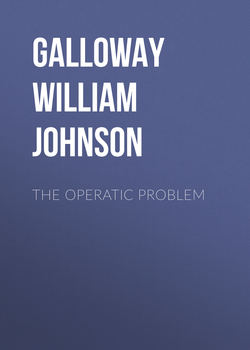Читать книгу The Operatic Problem - Galloway William Johnson - Страница 1
ОглавлениеPreface
Last autumn, having to speak at an organ recital given by my friend Mr Clegg, I took the opportunity of giving what encouragement lay in my power, to the Corporation of my native town, in an endeavour they had made during the summer months to provide suitable music in the various parks throughout the city. To my great surprise that speech was quoted in journals, of all shades of opinion, in the country, and brought me also a vast correspondence.
A copy of the speech will be found at the end of this book.
As I have long desired that Opera should be placed within the reach of those, whose purses are not able to bear the strain of the high prices charged in England, and having some leisure before Parliament met this year, I made inquiries regarding the various systems of running Opera on the Continent of Europe. I obtained a vast mass of most interesting information. How to make the best use of that information was my difficulty. It was much too bulky to compress into the narrow limits of a magazine article, and besides, much of it had no peculiar interest for us in this country.
My chief desire was to put it before the public in a form that would arouse interest in the subject. Also, I realised that this information, however valuable, was like the desert, in its unwieldy form, and without any attempt to outline the conclusion to which it led. So after much trepidation of thought I determined to run the gauntlet and march right up to the cannon's mouth with a scheme of my own for the establishment of a system for National Opera in this country.
This little book is the result of my efforts, and though I do not pretend that it offers a complete solution of the question, still less that it gives a coup de grâce to the schemes of those who have trodden the same path before me, I do hope it may help to call into existence some plan for the foundation of Opera upon a popular basis.
To my critics – and many I shall have – I venture to say that, however much they disagree, they should remember I lay no claim to completeness, and I will gladly welcome any suggestions thrown out with a real desire to perfect my very imperfect ideas.
But there are two forms of criticism I wish to meet in advance.
The first is the criticism of those, who will say it is useless hoping to get public money for a luxury, whilst the nation is engaged in a costly war. I frankly and freely admit the force of such criticism, but I would urge in reply that a proposal like mine has far to travel, before it takes its final shape, and one cannot hope to get Parliament to take the matter up until the subject has been fully ventilated in the country. And although at such a time our first thoughts should be given to those who are fighting our battles in the field, surely no harm, and possibly much good, may come from considering how we can deal with the social problems which confront us.
The second form of criticism is perhaps more easily met, namely, the criticism of those who look upon all theatres and opera houses as vicious and contra bonos mores. This battle was fought by Molière in the seventeenth century. Prescott, in his delightful essay on Molière, tells us what difficulties that author had to face at the beginning of his career on these very grounds. The clergy, alarmed at the then rapidly-increasing taste for dramatic exhibitions, openly denounced the theatre as an insult to the Deity, and Molière's father anticipated in the calling his son had chosen no less his spiritual than his temporal perdition. Yet who is there to-day who will deny that Molière helped to correct the follies of his age, by exposing them to ridicule? And if in providing National Opera for the people, we can assist in the higher education of the community, we may well ask those who object on the grounds I have named, to remember that "there is no felicity upon earth which carries not its counterpoise of misfortunes," and that the evils they fear are not inherent only to the stage, but also exist in almost every other walk of life.
